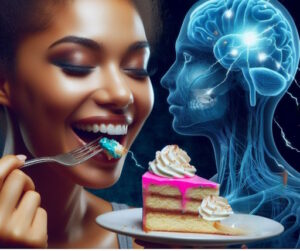The most common response when you ask people what they desire is happiness or anything that will increase their happiness. Trying to keep up with the pursuit of pleasure may be a daunting task in today’s fast-paced society. We can’t deny the joy of the dopamine spike from biting into a sweet dessert. The brain’s recognition mechanism is what causes this fleeting happiness—a brief surge of pleasure. As a motivator, dopamine pushes us to pursue actions that yield immediate satisfaction. The pleasure, however, is fleeting, and we frequently find ourselves craving more as the first rush wears off.
The fleeting satisfaction of eating a sweet treat is a momentary pleasure, but it’s important to remember that. For a little while, they can take your mind off the daily problems you face. Although these pleasures are nice, they do not add much to our happiness or contentment in the long run. Because these joys don’t last, people keep seeking them out, yet they are never delighted.
 Indulging in a sweet snack after a long day at the office is a great way to relax and unwind. The sugar rush and dopamine release bring about a brief period of happiness and relaxation. The stress remains, though, after the immediate pleasure wears off. As a result, you find yourself reaching for more sweet foods, such as ice cream, chocolate, or biscuits.
Indulging in a sweet snack after a long day at the office is a great way to relax and unwind. The sugar rush and dopamine release bring about a brief period of happiness and relaxation. The stress remains, though, after the immediate pleasure wears off. As a result, you find yourself reaching for more sweet foods, such as ice cream, chocolate, or biscuits.
As this habit persists, your reliance on sweet snacks to cope with stress and emotions increases. When people are anxious or unhappy, they may seek solace in sweets, which can lead to an unhealthy cycle of overconsumption. Your happiness and contentment remain elusive, even if you get fleeting pleasure from each delight.
Adverse outcomes are possible outcomes of this self-defeating cycle of increasing consumption of temporary pleasures. It has real-world consequences, including increased body fat, low energy levels, and, in the long run, diseases like diabetes and heart disease. Realising you have bad habits but not being able to alter them can cause psychological distress in the form of guilt, humiliation, and further stress. A vicious cycle of dissatisfaction and an inability to discover true happiness may develop if you give in to these transient pleasures too often.
Happiness, on the other hand, is a more persistent and profound state of being. Finding long-term happiness and fulfilment is more important than experiencing fleeting joy. The things that truly matter—the people we surround ourselves with and the impact we have on the world—are the things that bring us the most joy. A sense of accomplishment, belonging, and tranquillity are the building blocks that accumulate through time.

Family is everything
The people we’re connected to and our relationships are some of the most fundamental components of our happiness. You can feel supported and at home when you spend time with people you care about, listening to their stories and creating memories with them. Beyond the fleeting pleasure of a sweet treat, these friendships enrich our lives significantly. Building and maintaining these relationships is the key to long-term happiness.
The lasting satisfaction of genuine friendships and experiences, on the other hand, actually enhances our lives, even though the pleasure of a sweet treat is fun. By giving priority to these deeper sources of happiness, you may build a more satisfying and happy life that lasts beyond the fleeting euphoria of fleeting pleasure.
The Neuroscience of Pleasure
The neurotransmitter dopamine is associated with the reward and pleasure systems in the brain. It is released when we engage in pleasurable activities, such as eating a tasty dessert. Dopamine is essential for motivation and pleasure perception. It is an integral component of the brain’s reward circuitry, which also contains regions critical to the processing of rewards, such as the ventral tegmental area and the nucleus accumbens.
The combination of taste, smell, and texture we encounter when biting into a sweet food, like cake, sets off a chain reaction in our brains. Dopamine is released, leading to a state of contentment and pleasure. This physiological response is the brain’s way of telling us that we’ve discovered something good and pleasurable, making us want to do it again. This system has evolved to make feeding more enjoyable, a habit crucial to survival.

The pleasure, however, is fleeting while engaged in such pursuits. The first burst of dopamine produces a brief high, but it quickly wears off. As dopamine levels decrease, the cake’s pleasure and sweetness swiftly disappear. Due to the transient nature of the joy that dopamine induces, we tend to seek out situations that might replicate its effects. This is why seeking out other forms of quick satisfaction is easy, like eating another piece of cake.
Unfortunately, the fleeting nature of dopamine-induced pleasure can lead to an unhealthy obsession with seeking out and consuming more of the drug in the hopes of re-creating the original, delightful feeling. In the long run, our health will suffer because of this loop.
Although the brain’s reward system relies on dopamine-driven pleasures, it’s crucial to remember that these experiences aren’t meant to bring long-term happiness. These fleeting feelings of joy do not considerably increase one’s level of happiness over time. Instead, they provide a reprieve from the monotony or stress of everyday life.
A firm grasp of the neurobiology of pleasure can help us better understand the allure and subsequent desire for particular activities. In the long run, pleasure may bring a deeper sense of contentment and well-being; therefore, it’s important to look for sources of lasting happiness.
The Essence of Happiness
In contrast to the transient pleasure that dopamine generates, happiness is a more permanent and long-lasting sensation of well-being that spans a diverse array of events. Happiness, a fleeting emotion, is defined by a long-lasting feeling of contentment and fulfilment. The many factors contributing to an entire and meaningful existence are the origins of this enduring happiness, also known as eudaimonic well-being.
Sources of Lasting Happiness
Personal Growth
Personal development and progress may be a great source of happiness. Doing things that push us to our intellectual, emotional, or spiritual limits gives us a lasting sense of accomplishment and fulfilment. Discovering and fulfilling one’s passions, expanding one’s skill set, or reaching one’s objectives are all ways to develop and better oneself.
Fulfilling Relationships
Maintaining satisfying connections is another key to long-term happiness. When our connections with our spouses, friends, and extended family are solid and supportive, we feel a sense of emotional security, homecoming, and belonging. The companionship, love, and support that these connections provide are essential to our health and happiness. We find true joy when we share our lives with others, trust and respect each other, and have a solid support system.

Meaningful Experiences
One of the most important things we can do to achieve long-term happiness is to engage in activities that truly matter. Things like rewarding careers, hobbies, or volunteer work that make a big difference in people’s lives fall under this category. These significant experiences enrich a well-lived life and give meaning to one’s existence.
The Complex Interplay of Emotions
Emotional and mental health interact in intricate ways to bring about happiness. It includes the capacity to experience and overcome unpleasant emotions like grief, rage, and tension, as well as more positive ones like happiness, contentment, and love. You must be emotionally resilient if you want your joy and happiness to last. Through it, we can maintain composure and view life’s highs and lows in context.
Happiness is about the cumulative impact of several happy events over time, as opposed to the fast surge of pleasure from dopamine, which is solid but brief. The quality of our life is more important than the intensity of any one moment. You may build happiness and give your life significance by cultivating excellent contacts and accumulating a sequence of successes and experiences that bring you joy.
The story’s moral is that happiness comes from developing oneself, having meaningful connections, and experiencing life to the fullest, not from the pleasure of eating cake. We may create a complete, fulfilled, and joyous life by focusing on these deeper sources of happiness rather than the transient pleasures.
Happiness vs Pleasure: Savouring the Moments That Matter appeared first on Nutritionist Pershore.
The Article: Choosing Happiness Over Pleasure: Savouring Important Moments appeared first on Jane Stevens.
The Article Choosing Happiness Over Pleasure: Savouring Important Moments Was Found On https://limitsofstrategy.com


You’ve hit the nail right on the head with the whole dopamine pursuit cycle! It reminds me of my relationship with ice cream—pure joy with every spoonful, but if I’m not careful, I could end up drowning in a tub of regret alongside my empty pint containers. And don’t get me started on that post-dessert guilt trip!
I totally get what you mean about ice cream; it can be such a double-edged sword. Every spoonful does feel like a little slice of happiness in the moment, but then there’s that reality check afterward. It’s interesting how food can create such a strong emotional response. I’ve had my fair share of late-night snacks that seemed like a great idea at the time but left me feeling a bit off the next day.
I totally get what you’re saying about ice cream—it’s such a classic example of that dopamine rollercoaster! Those first few bites can feel like pure bliss, but it’s so easy to get caught up in the moment and lose track of how much you’re having. It’s like opening a window to joy, but then the guilt sneaks in for a visit afterward, right?
Your exploration of the fleeting nature of pleasure really resonates with me. It’s fascinating how deeply ingrained our pursuit of that dopamine spike is in our daily lives. I often find myself caught in this cycle of seeking immediate gratification, whether through food, binge-watching shows, or scrolling through social media. Each moment of pleasure seems to create a longing for the next one, which can leave me feeling unsatisfied and more anxious in the long run.
It’s interesting how we often find ourselves in that cycle of immediate gratification. The quick hits of pleasure can create a kind of rush, but then there’s that lingering sense of dissatisfaction hanging around. It’s almost like they promise more than they can deliver, that next dopamine spike always just out of reach.
You raise a really intriguing point about the cycle of immediate gratification. I often find myself caught in that same rhythm, chasing those quick hits of pleasure—be it scrolling through my phone, indulging in snacks, or binge-watching a show. It’s almost comforting in a way, but like you mentioned, that lingering sense of dissatisfaction always creeps in. It’s as if we’re conditioned to believe that the next ‘fix’ will somehow fulfill us, but it rarely does.
It’s great to hear your thoughts on the fleeting nature of pleasure. The struggle with that cycle of immediate gratification is something many of us can relate to. Who hasn’t found themselves annihilating a bag of chips while mindlessly scrolling through social media or binge-watching an entire season of a show? It’s like a well-worn path we all find ourselves on at one point or another.
It’s powerful how you’ve articulated that struggle between immediate gratification and lasting satisfaction. The cycle you describe is all too familiar. Engaging in those quick hits of pleasure can feel rewarding in the moment, but it often leaves us craving more, doesn’t it?
You’ve hit on something really profound here about the nature of happiness and how our society often confuses momentary pleasures with true fulfillment. I’ve noticed in my own life that the sweets and other instant gratifications, while delicious, can sometimes leave me feeling empty afterward.
I really resonate with your observations about the fleeting nature of pleasure and how it often leads us on this endless chase for more. It reminds me of a conversation I had with a friend about the concept of ‘instant gratification’ in our current culture—whether it’s sugary snacks, binge-watching shows, or mindlessly scrolling through social media. We’re constantly bombarded with options that promise a quick dopamine hit, but as you mentioned, they rarely lead to lasting happiness or fulfillment.
Your point about instant gratification really hits home. It’s interesting to think about how these quick hits of pleasure can trick us into thinking we’re satisfied, when, in reality, we’re just skimming the surface of fulfillment. It’s almost like we’re trained to reach for the immediate reward, but what happens to that deep, satisfying contentment that comes from working toward something meaningful?